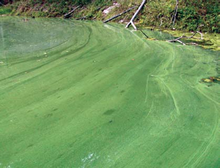
Blue-green algae, also known as cyanobacteria, are a group of photosynthetic bacteria found in lakes and slow moving streams. Increased phosphorus and nitrogen (nutrients) from fertilizers, warm weather, and low turbulence cause them to ‘bloom’ in large numbers. Phosphorus is particularly important in fueling their growth.
When blue-green algae grow unchecked in lakes, they may interfere with recreation in and on the water. Some blue-green algal strains produce toxins, threatening human and animal health. In extremely rare instances, toxin-producing blue-green algae have resulted in the sickness or death of animals, including livestock and particularly dogs.
When algal blooms die off, they sink to the bottom of the water body. The degradation of this organic matter consumes available oxygen in the water. This depletion of oxygen may be great enough to result in fish kills.
Some blue-green algae blooms can create an earthy or musty smell in lakes and reservoirs. In some cases, taste and odor from algal blooms can impair drinking water supplies that use a surface water source. Taste and odor compounds are not harmful and treated water is safe to drink. The Indiana DNR published a Q & A page for Hoosiers to refer to for all their concerns regarding blue-green algae.
The Indiana Department of Environmental Management (IDEM), along with the Indiana Department of Natural Resources (DNR), the Indiana State Department of Health (ISDH), and the Board of Animal Health (BOAH) are working together to provide information about blue-green algae in our lakes.